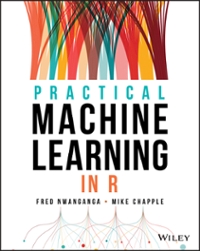5. After building the regression model in exercise 3, you return to the same dataset and want...
Question:
5. After building the regression model in exercise 3, you return to the same dataset and want to know whether the age of a student at application time is also a contributing factor to their GPA. You add this element to a multiple regression model and receive the results shown here:
Call:
lm(formula = gpa ~ test + age)
Residuals:
1 2 3 4 5 6 7
-0.16842 0.02851 -0.07939 0.13158 0.07456 0.12807 -0.11798 8
0.00307 Coefficients:
Estimate Std. Error t value Pr(>|t|)
(Intercept) -1.900439 0.984841 -1.930 0.11153 test 0.025702 0.004937 5.206 0.00345 **
age 0.182456 0.064412 2.833 0.03656 *
---
Signif. codes: 0 ‘***’ 0.001 ‘**’ 0.01 ‘*’ 0.05 ‘.’ 0.1 ‘ ’ 1 Residual standard error: 0.1332 on 5 degrees of freedom Multiple R-squared: 0.9328, Adjusted R-squared: 0.9059 F-statistic: 34.71 on 2 and 5 DF, p-value: 0.00117 Chapter 4: Linear Regression 163
a. According to this model, what impact would a single point increase in admissions test score have on the prediction of a student’s GPA? How about a single year increase in age?
b. If a student scored 82 on the admissions test and was 17 years old at the time of application, what would be your prediction of their GPA?
c. If another student scored 97 on the admissions test and was 19 years old at the time of application, what would be your prediction of their GPA?
d. How well does this model fit the data based upon the adjusted R-squared? How does that compare to the model from exercise 3?
V6. Returning to the bicycle rental dataset, convert your simple regression model from exercise 4 to a multiple regression model that predicts realfeel based upon temperature, windspeed, and humidity. Explain your model and describe how well it fits the data, compared to the model you created in exercise 4.
Step by Step Answer:

Practical Machine Learning In R
ISBN: 9781119591535
1st Edition
Authors: Fred Nwanganga, Mike Chapple






